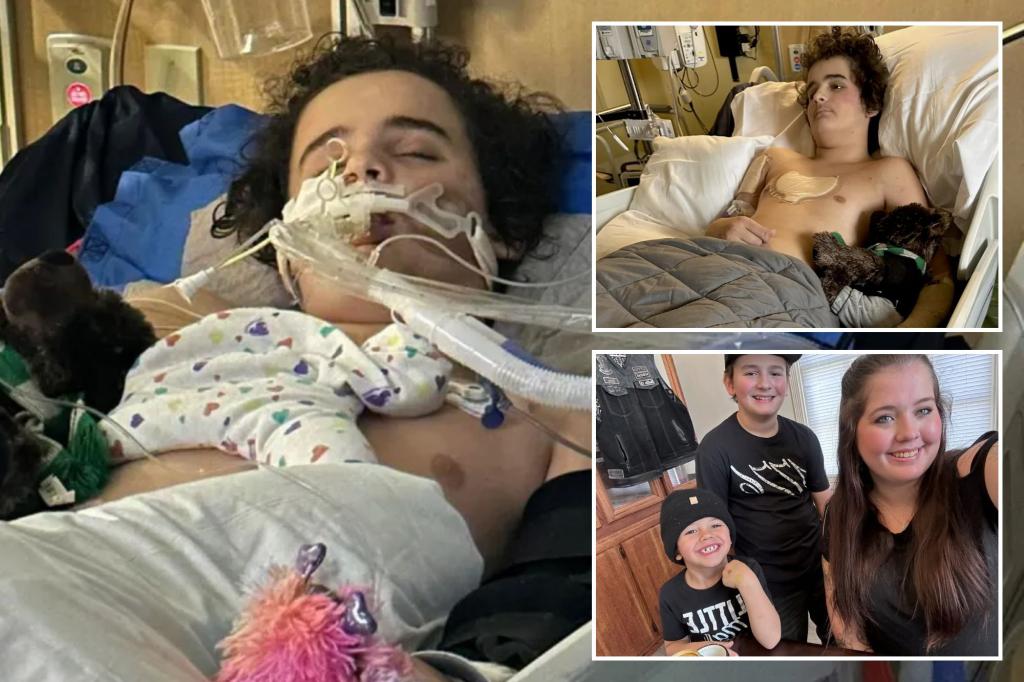Summarize and humanize this content to 2000 words in 6 paragraphs in English
The teenager who survived three days at the bottom of a 240 foot ravine after a skateboarding accident is facing a setback in his recovery amid serious complications.
Dakota “Cody” Trenkle Jr., 13, went missing on July 27, after he was last seen skateboarding in Goose Creek Lake, Missouri.
And after three days without food and water, a K-9 unit found him barely alive at the bottom of a ravine.
Trenkle Jr. was airlifted to hospital and put in a medically induced coma, and on a ventilator, for nearly two weeks.
His mom maintained a bedside vigil and against the odds his recovery looked promising, with the family saying he was due to be moved to a rehab facility.
But speaking yesterday (14) his mom Stephanie Neely, 29, a corrections officer from Potosi, revealed he is now facing serious liver complications and doctors have extended his stay in the ICU for testing, delaying his planned transfer to a rehabilitation facility.
She also revealed more details about precisely how her son survived in the ravine — how he was able to survive dehydration and what kept his temperature down.
“We learned today that his liver is not doing great,” Neely said. “His enzymes are super high, and they’re really concerned.
“He may need surgery.
“Yesterday I felt like we were in a good place.
“He spent his first full day off sedation, and we actually got to go downstairs to walk.
“The plan was for the other hospital to pick him up today, but now everything with his liver has me pretty concerned again.”
Neely and her husband, Jared, 33, also a corrections officer from Potosi, share two other boys: Steven, 11, and Parker, six.
Trenkle was reported missing on July 27 after disappearing while skateboarding near his grandmother’s home in Goose Creek Lake, an unincorporated community about an hour outside St. Louis.
Neely expressed frustration with how authorities initially handled the case.
“Even the deputies who did the initial report said it seemed suspicious,” Neely said.
“As soon as it got turned over to the detective the next morning, he just kept trying to push the narrative that Cody was just another juvenile runaway, which we all knew wasn’t true.”
It was ultimately family-organized search parties, with help from Neely’s sister’s volunteer fire department and fellow corrections officers from the prison where Neely works, that led to a breakthrough.
Trenkle’s skateboard was found about half a mile from the family’s home by his younger brother, Steven, and shortly afterward search dogs located the teen at the bottom of a ravine, barely alive.
“I heard my sister go over the radio saying, ‘We found him, we found him. He’s alive,” Neely said.
“I broke down in the middle of the street, bawling hysterically, just trying to make my way down to where they had found him.”
Trenkle had survived three and a half days without food or water in dangerous heat conditions.
Neely believes his survival was due to “the perfect storm” of circumstances.
“He ended up landing underneath some pretty thick brush, which helped shade him from the sun during the heat warning,” she said.
“He was lying in five inches of water, which helped maintain his body temperature, and his body probably absorbed some of that water, even though he came in extremely dehydrated.”
After being airlifted to a St. Louis hospital, Trenkle spent 11 days in a medically induced coma before waking up.
While he can now speak, his mother notes his speech patterns are delayed due to brain injuries, and he’s experiencing short-term memory loss.
“He’s still not talking like Cody would talk,” Neely said. “He’s still not fully back to himself.
“It’s something that we’re going to have to work with occupational therapy on, and he may never fully have his memory back.”
Neely remains cautiously optimistic about her son’s future.
“I believe that it’s going to be a long road of recovery with therapies,” she said.
“Even when he’s done with inpatient, he’s still going to have a lot of outpatient therapies with physical and occupational, but I believe at the end of that road, he can be mostly normal.
She added: “We’re just taking it day by day and hoping that he keeps making small progress in the right direction.”


